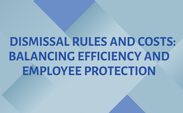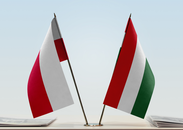-

-

-

-

-

Poland is a leader in social spending among post-socialist countries | 2021-01-29
Of the post-socialist OECD countries, only the Czech Republic, Estonia and Lithuania increased their social expenditures more, but to a lower level than in Poland. On the other hand, Hungary, Slovenia and Slovakia decreased social expenditures in relation to GDP.more -

Will liberalizing exemptions accelerate recovery from a pandemic recession? | 2021-01-15
moreLiberalizing regulations on the termination of employment contracts could accelerate Poland's recovery from the pandemic recession by giving companies additional incentives to create new jobs. In the face of great uncertainty about the administrative closures of entire industries, reducing the restrictiveness of layoffs would reduce companies' risks in hiring new workers. The Law and Justice government for the duration of the epidemic limited the legal minimum amount of severance pay for dismissed employees to ten times the minimum wage - in our view, this solution should remain in place permanently and be combined with further liberalization steps such as removing the obligation to provide a reason for termination.
-

Law on pharmacy profession - another step towards closing the market | 2020-12-21
The provisions in the Act allow for the arbitrary closures of pharmacies by officials to the detriment of patients, pharmacists without pharmacies, and entrepreneurs. In addition, the Act grants the pharmacy manager quasi-ownership functions without imposing any accountability for their decisions. Under the provisions of the Act, it is the manager, not the owner, who will verify, for example, electricity suppliers.more -

In the international freedom and democracy indexes, Poland is falling in solidarity with Hungary | 2020-12-10
There are cases of indicators worsening in other countries of the region as well, however, with the exception of Hungary, these changes are not as significant as in Poland.more -

Jobs for a chosen few: Regulations continue to block access to professions | 2020-12-08
moreAt present in Poland there are still 360 regulated professions (with the EU median of 186). Among the EU countries there are more only in Hungary and the Czech Republic. Although access to some professions is easier after the deregulation carried out a few years ago, many of the planned changes were abandoned in the course of legislative work, so that the final form of facilitation in access to the professions turned out to be much less than announced.

The parliamentary resolution on the EU budget negotiations is full of misrepresentations | 2020-11-19
On 19 November, the parliamentary majority (KP [Polish Coalition], PiS [Law and Justice], and Kukiz'15 deputies), in response to Prime Minister Mateusz Morawiecki's announcement expressed the day before, adopted a resolution "supporting the activities of the Council of Ministers in the budget negotiations of the European Union"
